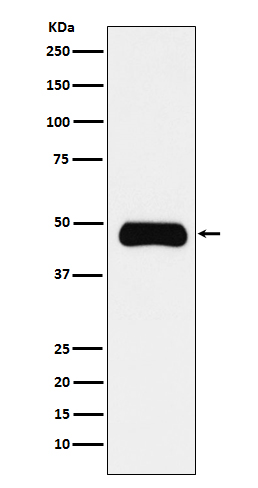ETS1 Antibody
Rabbit mAb
- SPECIFICATION
- CITATIONS
- PROTOCOLS
- BACKGROUND

Application
| WB, FC |
|---|---|
| Primary Accession | P14921 |
| Clonality | Monoclonal |
| Other Names | C ets 1 protein; ETS 1; ETS1; ETS1 oncogene; EWSR2; Oncogene ETS1; P54; Protein C-ets-1; |
| Isotype | Rabbit IgG |
| Host | Rabbit |
| Calculated MW | 50408 Da |
| Dilution | WB 1:500~1:2000 FC 1:80 |
|---|---|
| Purification | Affinity-chromatography |
| Immunogen | A synthesized peptide derived from human ETS1 |
| Description | Transcription factor. |
| Storage Condition and Buffer | Rabbit IgG in phosphate buffered saline , pH 7.4, 150mM NaCl, 0.02% sodium azide and 50% glycerol. Store at +4°C short term. Store at -20°C long term. Avoid freeze / thaw cycle. |
| Name | ETS1 |
|---|---|
| Synonyms | EWSR2 |
| Function | Transcription factor (PubMed:10698492, PubMed:11909962). Directly controls the expression of cytokine and chemokine genes in a wide variety of different cellular contexts (PubMed:20378371). May control the differentiation, survival and proliferation of lymphoid cells (PubMed:20378371). May also regulate angiogenesis through regulation of expression of genes controlling endothelial cell migration and invasion (PubMed:15247905, PubMed:15592518). |
| Cellular Location | Nucleus. Cytoplasm Note=Delocalizes from nucleus to cytoplasm when coexpressed with isoform Ets-1 p27. |
| Tissue Location | Highly expressed within lymphoid cells. Isoforms c- ETS-1A and Ets-1 p27 are both detected in all fetal tissues tested, but vary with tissue type in adult tissues. None is detected in brain or kidney. |

Thousands of laboratories across the world have published research that depended on the performance of antibodies from Abcepta to advance their research. Check out links to articles that cite our products in major peer-reviewed journals, organized by research category.
info@abcepta.com, and receive a free "I Love Antibodies" mug.
Provided below are standard protocols that you may find useful for product applications.
If you have used an Abcepta product and would like to share how it has performed, please click on the "Submit Review" button and provide the requested information. Our staff will examine and post your review and contact you if needed.
If you have any additional inquiries please email technical services at tech@abcepta.com.













 Foundational characteristics of cancer include proliferation, angiogenesis, migration, evasion of apoptosis, and cellular immortality. Find key markers for these cellular processes and antibodies to detect them.
Foundational characteristics of cancer include proliferation, angiogenesis, migration, evasion of apoptosis, and cellular immortality. Find key markers for these cellular processes and antibodies to detect them. The SUMOplot™ Analysis Program predicts and scores sumoylation sites in your protein. SUMOylation is a post-translational modification involved in various cellular processes, such as nuclear-cytosolic transport, transcriptional regulation, apoptosis, protein stability, response to stress, and progression through the cell cycle.
The SUMOplot™ Analysis Program predicts and scores sumoylation sites in your protein. SUMOylation is a post-translational modification involved in various cellular processes, such as nuclear-cytosolic transport, transcriptional regulation, apoptosis, protein stability, response to stress, and progression through the cell cycle. The Autophagy Receptor Motif Plotter predicts and scores autophagy receptor binding sites in your protein. Identifying proteins connected to this pathway is critical to understanding the role of autophagy in physiological as well as pathological processes such as development, differentiation, neurodegenerative diseases, stress, infection, and cancer.
The Autophagy Receptor Motif Plotter predicts and scores autophagy receptor binding sites in your protein. Identifying proteins connected to this pathway is critical to understanding the role of autophagy in physiological as well as pathological processes such as development, differentiation, neurodegenerative diseases, stress, infection, and cancer.


